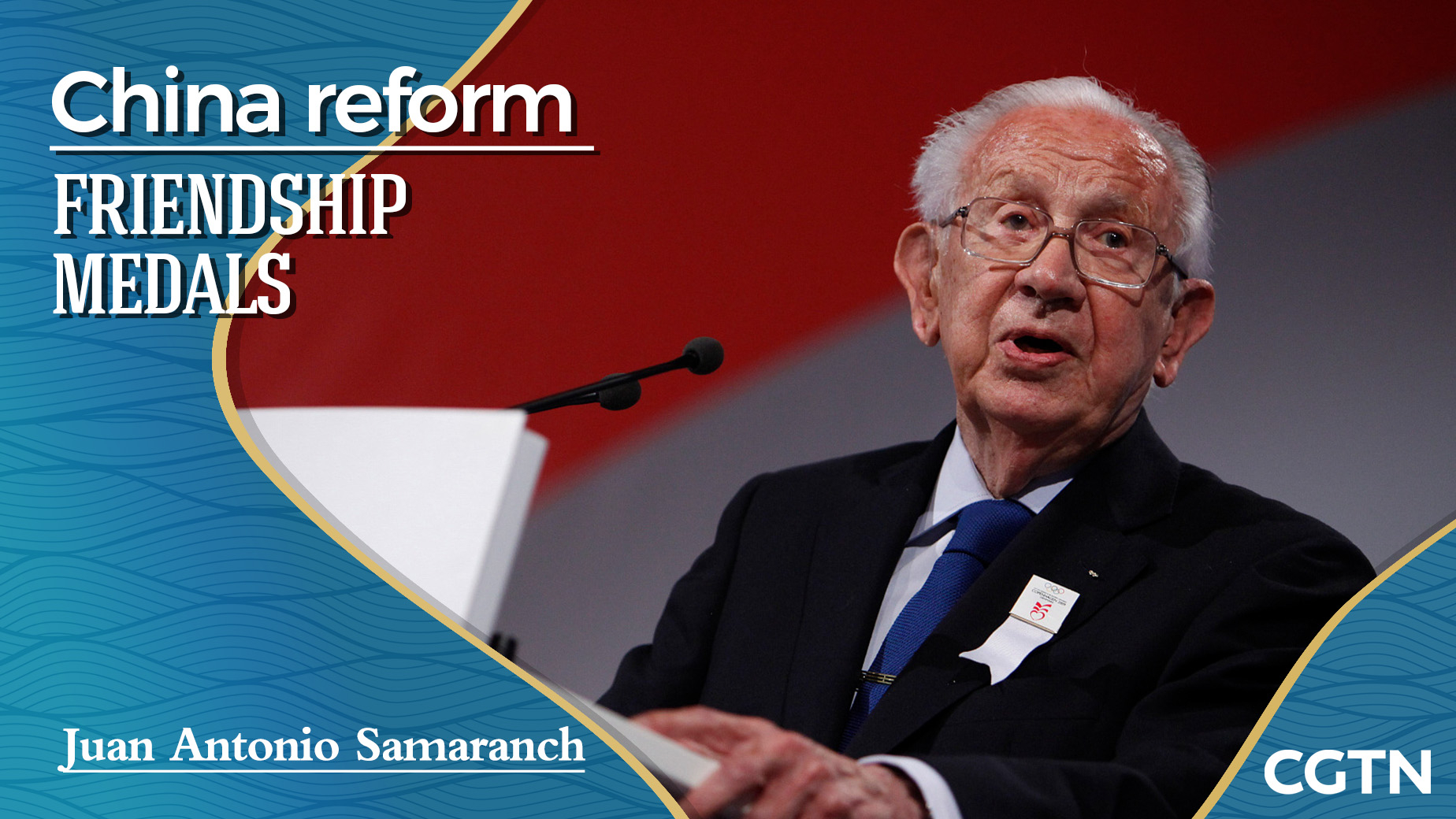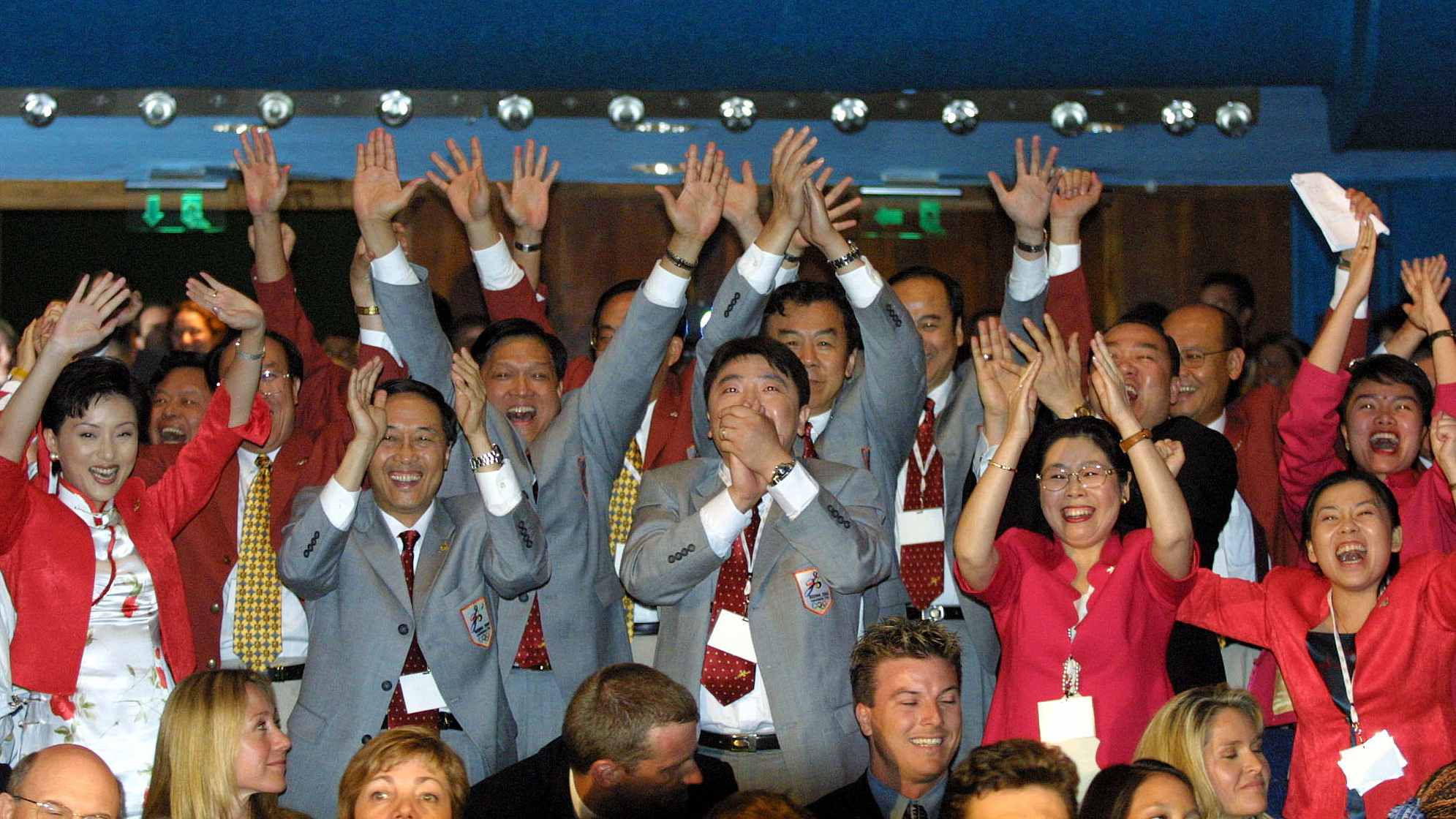
China
14:37, 18-Dec-2018
China Reform Friendship Medal Recipient: Juan Antonio Samaranch, blazing the trail for China's Olympics
Updated
14:10, 21-Dec-2018
CGTN

Former International Olympic Committee (IOC) president Juan Antonio Samaranch, who blazed a trail for China's Olympic dreams, was honored with China Reform Friendship Medal on the grand gathering celebrating the 40th anniversary of the country's reform and opening-up on Tuesday.
As one of ten foreign recipients of the medal, Samaranch (1920-2010) served as the chief of the IOC from 1980 – when China returned to the Olympics after more than two decades – to 2001, during which Beijing won the bid to host the 2008 Olympic Games.
The Spaniard has developed a long and profound friendship with China.
In 1952, the IOC invited China to participate in the Helsinki Olympic Games, marking the Olympic debut of Chinese athletes ever since the founding of the People's Republic of China in 1949. Coincidentally, it was also the first time for Samaranch to cover the Olympics as a reporter.
China initiated its "ping-pong diplomacy" at the 1971 Table Tennis World Championships, opening a new era for Chinese players in the international competitions. The same year, China's sports officials visited several IOC members, including Samaranch who just elected as a member of the IOC.
Samaranch visited Beijing in 1978 for the first time. On behalf of the IOC, he had in-depth talks with Chinese officials about the country's potential obstacles to rejoining the Olympics.
Following the joint efforts carried out by both parties, the IOC re-granted the official status of China in the Olympics in 1979 and remained the status of Chinese Taipei on the premise of its changed names and flags. A year later, 66-year-old Samaranch was elected as the seventh IOC president.
In March 1982, during a meeting in Beijing with Deng Xiaoping, hailed as the chief architect of China's reform and opening-up policy, Samaranch proposed that China could be a candidate to host the Olympics.
The 1984 Los Angeles Olympic Games witnessed the birth of China's first Olympic champion – Xu Haifeng, whose gold medal in the men's free shooting event was presented by Samaranch at the ceremony.
"I feel honored that I presented the award to Xu, who achieved China's first Olympic gold," said Samaranch.
"Later, I was invited by the Chinese government to Beijing to attend a ceremony that commemorated the 35th founding anniversary of (the) PRC."
He was also invited to attend the opening ceremony of the 1990 Asian Games in Beijing.
A year later, China submitted its bid for the 2000 Olympic Games. Even though Beijing had lost the race by just two votes to Sydney, the country made such a good impression on the IOC that Samaranch invited Beijing to bid again for the 2008 Olympics.

Beijing 2008 bid committee members are overjoyed as IOC President Juan Antonio Samaranch announces Beijing the host of the Summer 2008 Olympic Games in Moscow, Russia, July 13, 2001. /VCG Photo
Beijing 2008 bid committee members are overjoyed as IOC President Juan Antonio Samaranch announces Beijing the host of the Summer 2008 Olympic Games in Moscow, Russia, July 13, 2001. /VCG Photo
In 1999, China duly proposed to bid for the 2008 Olympic Games. And on July 13, 2001, in Moscow, Russia, Beijing finally won the race to stage the 29th Summer Olympic Games. The announcement, read out by Samaranch, was greeted with wild celebrations from the Chinese delegation in Moscow and with jubilation in the Chinese capital.
"I think to have the games one day to be held in the PRC will be very important for China, and also for the Olympic movement," said Samaranch.
"It is both my dream and China's dream that Beijing could host the 2008 Olympic Games."
After his retirement the same year, Samaranch paid multiple visits to China and brought many officials who once organized the Barcelona 1992 Olympic Games in helping the Beijing games.
Moreover, he was honored with a new title – president of China-Spain Economic Forum – as an envoy to witness China-Spain's long-term friendship.
In 2003, the Chinese version of Samaranch's biography was published in China, where he shared his Olympic memories with Chinese readers.
"As a Chinese athlete, you should make contributions to China," Chinese table tennis player Deng Yaping recalled her talks with Samaranch, who continuously encouraged her to contribute to promoting the development of sports in China.
"I can feel his friendship toward (the) Chinese people," Deng noted.

SITEMAP
Copyright © 2018 CGTN. Beijing ICP prepared NO.16065310-3
Copyright © 2018 CGTN. Beijing ICP prepared NO.16065310-3